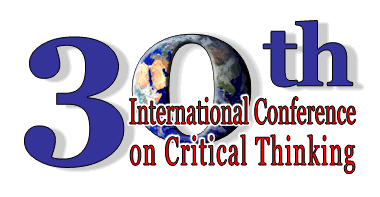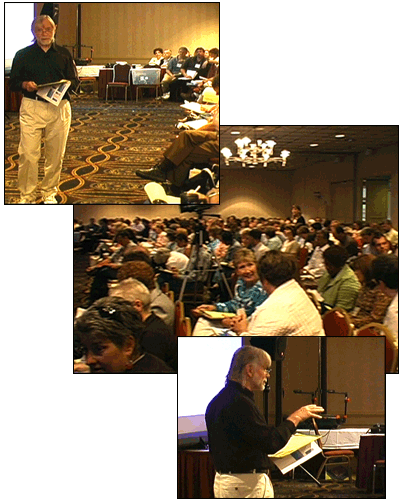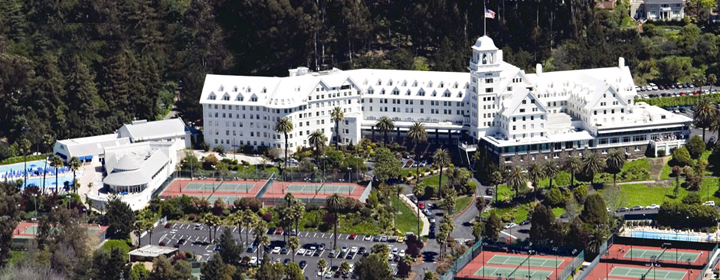Join us at the World's Longest Running Annual Conference on Critical Thinking...

2010 CONFERENCE THEME:
How To Teach Students To Master Content
By Developing A Questioning Mind
July 19 - 22, 2010
Preconference: July 17-18
Near U.C. Berkeley
The Center and Foundation for Critical Thinking have together hosted critical thinking academies and conferences for three decades. During that time, we have played a key role in defining, structuring, assessing, improving and advancing the principles and best practices of fair-minded critical thought in education and in society. We invite you to join us for the 30th International Conference on Critical Thinking. Our annual conference provides a unique opportunity for you to improve your understanding of critical thinking, as well as your ability to more substantively foster it in the classroom and in all aspects of your work and life.
 The conference will consist in approximately 40 conference sessions offered over four days. Participants will choose in advance the sessions offered on days one, two, and four. On the third day of the conference participants will choose from approximately 30 sessions. We invite both new and returning participants to join us for the preconference, to be held July 17-18, 2010. Note that this year a number of advanced sessions (including two preconference sessions) are offered for returning registrants and those who have participated in our professional development programs onsite. Preconference sessions offer an occasion for in-depth learning over a two-day period (choose among 4 options).
The conference will consist in approximately 40 conference sessions offered over four days. Participants will choose in advance the sessions offered on days one, two, and four. On the third day of the conference participants will choose from approximately 30 sessions. We invite both new and returning participants to join us for the preconference, to be held July 17-18, 2010. Note that this year a number of advanced sessions (including two preconference sessions) are offered for returning registrants and those who have participated in our professional development programs onsite. Preconference sessions offer an occasion for in-depth learning over a two-day period (choose among 4 options).
All conference sessions are designed to converge on basic critical thinking principles and to enrich a core concept of critical thinking with practical teaching and learning strategies. For a fuller explanation of core critical thinking concepts review the Thinker's Guide Series or articles from our library.
Throughout our work we emphasize and argue for the importance of teaching for critical thinking in a strong, rather than a weak, sense. We are committed to a clear and "substantive" concept of critical thinking (rather than one that is ill-defined); a concept that interfaces well with the disciplines, that integrates critical with creative thinking, that applies directly to the needs of everyday and professional life, that emphasizes the affective as well as the cognitive dimension of critical thinking, that highlights intellectual standards and traits. We advocate a concept of critical thinking that organizes instruction in every subject area at every educational level.
Download the
Conference Flyer » | |
{"id":"1615","title":"","author":"","content":"<div>\r\n<p style=\"text-align: center;\"><span style=\"color: #000080;\"><strong><span><br /> Join us at the World's Longest Running Annual Conference on Critical Thinking</span></strong></span><span>...</span><span><br /> </span></p>\r\n<p><img src=\"https://www.criticalthinking.org/image/pimage/30THCONFad-web2.gif\" alt=\"\" hspace=\"0\" vspace=\"30\" align=\"right\" /></p>\r\n<p style=\"text-align: center;\"><br /> <span><span style=\"font-family: verdana,geneva,arial,helvetica,sans-serif; color: #3366ff; font-weight: bold;\"><strong>2010 CONFERENCE THEME:</strong></span><span><br /> <em><strong><span style=\"color: #000080;\">How To Teach Students To Master Content<br /> By Developing A Questioning Mind</span></strong></em></span><br /> <span><br /> </span></span><span><span style=\"color: #800000;\"><strong>July 19 - 22, 2010</strong></span><span><span style=\"color: #800000;\"><br /> </span><strong><span style=\"color: #800000;\">Preconference: July 17-18<br /> </span></strong></span></span><span style=\"color: #333399;\"><em><strong>Near U.C. Berkeley</strong></em></span><span><span><strong><span style=\"color: #800000;\"><br /> <br /> </span></strong></span></span> <!--- <i><a href=\"https://www.criticalthinking.org/store-page.cfm?P=conference&itemID=389\" _mce_href=\"https://www.criticalthinking.org/store-page.cfm?P=conference&itemID=389\" style=\"border-bottom: navy 1px solid; border-left: navy 1px solid; padding-bottom: 3px; background-color: white; padding-left: 3px; padding-right: 3px; color: blue; ; border-top: navy 1px solid; font-weight: bold; border-right: navy 1px solid; padding-top: 3px\" _mce_style=\"background-color: white; color: blue; font-weight: bold; border: navy 1px solid; padding: 3px;\"><i>CLICK HERE TO REGISTER ONLINE</i></a></i>---></p>\r\n<p style=\"text-align: left;\"><span><span><br /> The Center and Foundation for Critical Thinking have together hosted critical thinking academies and conferences for three decades. During that time, we have played a key role in defining, structuring, assessing, improving and advancing the principles and best practices of fair-minded critical thought in education and in society. We invite you to join us for the 30th International Conference on Critical Thinking. Our annual conference provides a unique opportunity for you to improve your understanding of critical thinking, as well as your ability to more substantively foster it in the classroom and in all aspects of your work and life.</span></span></p>\r\n<p style=\"text-align: left;\"><span><img src=\"https://www.criticalthinking.org/image/pimage/Keynotew-combined.png\" border=\"0\" alt=\"\" align=\"right\" />The conference will consist in approximately 40 conference sessions offered over four days. Participants will choose in advance the sessions offered on days one, two, and four. On the third day of the conference participants will choose from approximately 30 sessions. We invite both new and returning participants to join us for the preconference, to be held July 17-18, 2010. Note that this year a number of advanced sessions (including two preconference sessions) are offered for returning registrants and those who have participated in our professional development programs onsite. <a href=\"https://www.criticalthinking.org/Conference/2010_Preconference.cfm\">Preconference sessions</a> offer an occasion for in-depth learning over a two-day period (choose among 4 options).<br /> <br /> All conference sessions are designed to converge on basic critical thinking principles and to enrich a core concept of critical thinking with practical teaching and learning strategies. For a fuller explanation of core critical thinking concepts review the </span><a href=\"https://www.criticalthinking.org/store/catalogs/thinkers-guides/224\"><span>Thinker's Guide Series</span></a><span> or </span><a href=\"https://www.criticalthinking.org/articles/index.cfm\"><span>articles from our library.<br /> </span></a><span><br /> Throughout our work we emphasize and argue for the importance of teaching for critical thinking in a strong, rather than a weak, sense. We are committed to a clear and \"substantive\" concept of critical thinking (rather than one that is ill-defined); a concept that interfaces well with the disciplines, that integrates critical with creative thinking, that applies directly to the needs of everyday and professional life, that emphasizes the affective as well as the cognitive dimension of critical thinking, that highlights intellectual standards and traits. We advocate a concept of critical thinking that organizes instruction in every subject area at every educational level.<br /> </span></p>\r\n<table style=\"width: 743px; height: 54px;\" border=\"0\" cellspacing=\"1\" cellpadding=\"4\" width=\"561\" height=\"54\" bgcolor=\"silver\">\r\n<tbody>\r\n<tr valign=\"top\">\r\n<td bgcolor=\"#9999cc\"><strong style=\"color: white; font-weight: bold;\">Download the<br /> </strong><strong style=\"color: white; font-weight: bold;\">Conference Flyer</strong><strong style=\"color: white; font-weight: bold;\"><span style=\"font-size: xx-small;\"> »</span> </strong></td>\r\n<td valign=\"center\" bgcolor=\"white\">\r\n<ul>\r\n<li> <a href=\"https://www.criticalthinking.org/files/FCT%2030th%20Intl%20Conf%20flyer_08.pdf\" target=\"_blank\">2010 Conference on Critical Thinking Flyer (Acrobat PDF file) </a></li>\r\n</ul>\r\n</td>\r\n</tr>\r\n</tbody>\r\n</table>\r\n</div>\r\n<p><br style=\"clear: both;\" /></p>","public_access":"1","public_downloads":"1","sku":"","files":{"0":{"id":"346","filename":"PreConf_Schedule_2010.doc","realfilename":"PreConf_Schedule_2010.doc","title":"PreConf_Schedule_2010.doc","order":1},"1":{"id":"347","filename":"Conf_Schedule_2010.doc","realfilename":"Conf_Schedule_2010.doc","title":"Conf_Schedule_2010.doc","order":2}},"images":{}}
29th Conference Keynote Video
{"id":1616,"title":"29th Conference Keynote Video","author":"","content":"<p><span>The keynote address from the 29th Annual Conference is available on YouTube in a five-part series. <a href=\"https://www.youtube.com/watch?v=mj1TD9gky0E&amp;feature=PlayList&amp;p=4ED2E2C1E9F0A213&amp;index=0&amp;playnext=1\" target=\"_blank\">Click Here to watch Dr. Richard Paul's Keynote Address</a>.<br /> </span></p>\r\n<p><br style=\"clear: both;\" /></p>","public_access":"1","public_downloads":"1","sku":"","files":{},"images":{}}
| CONFERENCE OVERVIEW |
| Choose from the following sessions when registering. Choose one for each day section. See preconference and conference schedule and sessions for full titles and descriptions.
PRECONFERENCE - Socratic Questioning
- Assess Students Learning and Thinking
- Advanced Session: Develop a Thinker’s Guide
- Advanced Session: Questioning the Heart of the Critical Thinking Field
DAY ONE - Foundational Session (for new registrants)
- Advanced Session: Going Deeper: (for returning registrants)
DAY TWO Morning - Taking Ownership of Content Through Thinking
- Skilled Questioning and Close Reading
- Critical Thinking: Many Things to Many Persons
- Paulian Framework of Critical Thinking
DAY TWO Afternoon - Develop Long-Term Staff Development Plan
- Critical Questions Students Should be Asking
- Skilled Questioning and Substantive Writing
- Advanced Session: Skilled Learner as Skilled Questioner
DAY THREE - Concurrent sessions - choose at the conference, from among 30 sessions
DAY FOUR Afternoon - The Power of the Thinker’s Guide Library
- Teaching Students to Ask Multilogical Questions
- Male Chauvinism, Vulgar Feminism, Human Dogmatism
- Advanced Session: Advanced Design of Instruction
|
Conference Plan and Sessions:
DAY TWO Morning: Tuesday
(you choose one of the following sessions for the morning)…
DAY TWO Afternoon: Tuesday
(you choose one of the following sessions for the afternoon)…
DAY THREE: Wednesday
- Concurrent sessions. Participants will choose from among numerous concurrent sessions while at the conference. Concurrent sessions are invited, and will be posted presently.
DAY FOUR Morning: Thursday
(you choose one of the following sessions for the morning)…
This year's conference will be held at the Claremont Resort Hotel & Spa near U.C. Berkeley, California. More information on the Claremont Hotel

{"id":1617,"title":"","author":"","content":"<table style=\"background-color: #000099; width: 300px;\" border=\"0\" cellspacing=\"1\" cellpadding=\"5\" align=\"right\">\r\n<tbody>\r\n<tr valign=\"center\">\r\n<td style=\"text-align: center;\"><strong class=\"head\" style=\"color: white;\">CONFERENCE OVERVIEW</strong></td>\r\n</tr>\r\n<tr>\r\n<td bgcolor=\"#ffffcc\">\r\n<div id=\"cke_pastebin\"><em><span style=\"font-family: comic sans ms,cursive;\"><span style=\"font-family: georgia,serif;\"><span style=\"font-family: tahoma,geneva,sans-serif;\">Choose from the following sessions when registering. Choose one for each day section.</span></span></span></em><strong><em>&nbsp; See preconference and conference schedule and sessions for full titles and descriptions.<br /> </em><br /> PRECONFERENCE</strong></div>\r\n<ul>\r\n<li> Socratic Questioning</li>\r\n<li> Assess Students Learning and Thinking&nbsp;</li>\r\n<li> Advanced Session: Develop a Thinker&rsquo;s Guide&nbsp;</li>\r\n<li> Advanced Session: Questioning the Heart of the Critical Thinking Field &nbsp;</li>\r\n</ul>\r\n<div id=\"cke_pastebin\"><strong>DAY ONE&nbsp;</strong></div>\r\n<ul>\r\n<li> Foundational Session (for new registrants)</li>\r\n<li> Advanced Session: &nbsp;Going Deeper: (for returning registrants)</li>\r\n</ul>\r\n<div id=\"cke_pastebin\"><strong>DAY TWO Morning</strong></div>\r\n<ul>\r\n<li> Taking Ownership of Content Through Thinking&nbsp;</li>\r\n<li> Skilled Questioning and Close Reading</li>\r\n<li> Critical Thinking: Many Things to Many Persons</li>\r\n<li> Paulian Framework of Critical Thinking&nbsp;</li>\r\n</ul>\r\n<div id=\"cke_pastebin\"><strong>DAY TWO Afternoon</strong></div>\r\n<ul>\r\n<li> Develop Long-Term Staff Development Plan&nbsp;</li>\r\n<li> Critical Questions Students Should be Asking&nbsp;</li>\r\n<li> Skilled Questioning and Substantive Writing</li>\r\n<li> Advanced Session: &nbsp;Skilled Learner as Skilled Questioner</li>\r\n</ul>\r\n<div id=\"cke_pastebin\"><strong>DAY THREE&nbsp;</strong></div>\r\n<ul>\r\n<li> Concurrent sessions - choose at the conference, from among 30 sessions</li>\r\n</ul>\r\n<div id=\"cke_pastebin\"><strong>DAY FOUR Afternoon&nbsp;</strong></div>\r\n<ul>\r\n<li> The Power of the Thinker&rsquo;s Guide Library</li>\r\n<li> Teaching Students to Ask Multilogical Questions&nbsp;</li>\r\n<li> Male Chauvinism, Vulgar Feminism, Human Dogmatism</li>\r\n<li> Advanced Session: Advanced Design of Instruction</li>\r\n</ul>\r\n</td>\r\n</tr>\r\n</tbody>\r\n</table>\r\n<p><span style=\"font-family: verdana,geneva,arial,helvetica,sans-serif; color: #3366ff; font-weight: bold;\"><strong>Conference Plan and Sessions:<br /> </strong></span></p>\r\n<div><span style=\"font-family: verdana,geneva,arial,helvetica,sans-serif; color: #660033; font-weight: bold;\">PRE-CONFERENCE</span><strong class=\"title\">: </strong>Saturday and Sunday<br /> <em>(you choose one of the following in-depth two-day sessions</em>)&hellip;<br /> <br /> <span><a style=\"font-weight: bold;\" href=\"../Conference/2010_Preconference.cfm#3341\">Using the tools of critical thinking in Socratic questioning</a>&hellip; <strong>Dr. Enoch Hale</strong><a style=\"font-weight: bold;\" href=\"../Conference/2010_Preconference.cfm#3342\"><br /> <br /> Using Critical Thinking Strategies to Assess Students Learning and Thinking within a Discipline</a>&hellip;<strong>Dr. Gerald Nosich</strong><a style=\"font-weight: bold;\" href=\"../Conference/2010_Preconference.cfm#3343\"><br /> <br /> Advanced Session:&nbsp;How to Develop a Thinker&rsquo;s Guide in Your Area of Expertise</a>&hellip; <strong>Dr. Linda Elder</strong><a style=\"font-weight: bold;\" href=\"../Conference/2010_Preconference.cfm#3344\"><br /> <br /> Advanced Session: Questioning the Heart of the Field (Thinking through the core concept of critical thinking,&nbsp;the manner in which the core can be contextualized, and the ways in which contextualizations of the core can generate intellectual controversy)</a>....<strong>Dr. Richard Paul</strong></span><br /> <span style=\"font-family: verdana,geneva,arial,helvetica,sans-serif; color: #660033; font-weight: bold;\"><br /> <br /> CONFERENCE</span>: Monday - Thursday<br /> <span style=\"font-family: verdana,geneva,arial,helvetica,sans-serif; color: #660033; font-weight: bold;\"><br /> DAY ONE</span><span style=\"color: #000080;\"><span><strong>: Monday</strong></span></span><br /> <em>(you indicate one of the following sessions, which runs all day following the morning key-note address</em>)&hellip;</div>\r\n<ul>\r\n<li> <span style=\"color: #000080;\"><span><strong>Foundational Session: For All New Registrants</strong></span></span><strong><a style=\"font-weight: bold;\" href=\"/Conference/2010_Sessions.cfm#3322\"><br /> Critical Thinking as Essential to Skilled Reasoning in Any Subject or Discipline</a>&hellip;</strong><br /> Participants will be assigned to one of three groups led by Dr. Linda Elder, Dr. Gerald Nosich, or Dr. Enoch Hale.&nbsp;</li>\r\n<li> <span style=\"color: #000080;\"><span><strong>Advanced Session:</strong></span></span><strong>&nbsp;<a style=\"font-weight: bold;\" href=\"/Conference/2010_Sessions.cfm#3323\"><strong>Foundations of Critical Thinking &ndash; Going Deeper</strong></a></strong> &hellip;Dr. Richard Paul</li>\r\n</ul>\r\n<div><strong>&nbsp;</strong><span style=\"font-family: verdana,geneva,arial,helvetica,sans-serif; color: #660033; font-weight: bold;\">DAY TWO Morning</span><span style=\"color: #000080;\"><span><strong>: Tuesday<br /> </strong></span></span><em>(you choose one of the following sessions for the morning</em>)&hellip;<span style=\"color: #000080;\"><span><strong><br /> </strong></span></span></div>\r\n<ul>\r\n<li> <a style=\"font-weight: bold;\" href=\"/Conference/2010_Sessions.cfm#3326\"><strong>Engaging Students in Taking Ownership of Content Through Thinking</strong></a>&hellip; Dr. Gerald Nosich&nbsp;</li>\r\n<li> <a style=\"font-weight: bold;\" href=\"/Conference/2010_Sessions.cfm#3327\"><strong>Helping Students Understand the Role of Skilled Questioning in Close Reading</strong></a>&hellip;Dr. Enoch Hale</li>\r\n<li> <strong><a style=\"font-weight: bold;\" href=\"/Conference/2010_Sessions.cfm#3328\">Critical Thinking: Many Things to Many Persons</a>&hellip;</strong>Dr. Richard Paul</li>\r\n<li> <a style=\"font-weight: bold;\" href=\"/Conference/2010_Sessions.cfm#3329\"><strong>Exploring Diverse Frameworks for Thinking; Suggesting the Paulian Framework as the center point of critical thinking as an academic discipline</strong></a>&hellip;Dr. Linda Elder</li>\r\n</ul>\r\n<div><strong>&nbsp;</strong><span style=\"font-family: verdana,geneva,arial,helvetica,sans-serif; color: #660033; font-weight: bold;\">DAY TWO Afternoon: </span><span style=\"color: #000080;\"><span><strong>Tuesday</strong></span></span><br /> <em>(you choose one of the following sessions for the afternoon</em>)&hellip;<span style=\"font-family: verdana,geneva,arial,helvetica,sans-serif; color: #660033; font-weight: bold;\"><br /> </span></div>\r\n<ul>\r\n<li> <a style=\"font-weight: bold;\" href=\"/Conference/2010_Sessions.cfm#3331\"><strong>How to develop a successful long-term staff development plan that fosters critical thinking</strong></a>&hellip;Dr. Linda Elder</li>\r\n<li> <strong><a style=\"font-weight: bold;\" href=\"/Conference/2010_Sessions.cfm#3332\">To Think Is To Question.&nbsp;To Think Critically Is To Ask Critical Questions.&nbsp;What Are Some Critical Questions Students Should be Asking To Learn at higher and higher levels?</a>...</strong> Dr. Gerald Nosich</li>\r\n<li> <a style=\"font-weight: bold;\" href=\"/Conference/2010_Sessions.cfm#3333\"><strong>Helping Students Understand the Connection Between Skilled Questioning and Substantive Writing</strong></a>&hellip;Dr. Enoch Hale&nbsp;</li>\r\n<li> <strong><a style=\"font-weight: bold;\" href=\"/Conference/2010_Sessions.cfm#3334\">Advanced Session:&nbsp;The Skilled Learner as Skilled Questioner</a></strong>&hellip;Dr. Richard Paul</li>\r\n</ul>\r\n<p><br /> <span style=\"font-family: verdana,geneva,arial,helvetica,sans-serif; color: #660033; font-weight: bold;\">DAY THREE: Wednesday</span></p>\r\n<ul>\r\n<li> Concurrent sessions. Participants will choose from among numerous concurrent sessions while at the conference.&nbsp; Concurrent sessions are invited, and will be posted presently.</li>\r\n</ul>\r\n<div><span style=\"font-family: verdana,geneva,arial,helvetica,sans-serif; color: #660033; font-weight: bold;\"><strong>DAY FOUR Morning: </strong></span><span style=\"color: #000080;\"><span><span style=\"font-weight: bold;\">Thursday<br /> </span></span></span><em>(you choose one of the following sessions for the morning</em>)&hellip;<span style=\"color: #000080;\"><span><span style=\"font-weight: bold;\"><br /> </span></span></span></div>\r\n<ul>\r\n<li> <strong><a style=\"font-weight: bold;\" href=\"/Conference/2010_Sessions.cfm#3336\">A Quick Look at the Whole: The Power of the Thinker&rsquo;s Guide Library</a>&hellip;</strong>Dr. Enoch Hale</li>\r\n<li> <strong><a style=\"font-weight: bold;\" href=\"/Conference/2010_Sessions.cfm#3337\">Teaching Students to Ask Multilogical Questions within a Field or Discipline</a>&hellip;</strong>Dr. Gerald Nosich</li>\r\n<li> <a style=\"font-weight: bold;\" href=\"/Conference/2010_Sessions.cfm#3338\"><strong>Questioning Male Chauvinism and Female </strong></a><strong><a style=\"font-weight: bold;\" href=\"/Conference/2010_Sessions.cfm#3338\"><strong>Chauvinism: Transcending Two Forms of Dogmatism; Toward Egalitarianism and Fairmindedness in Gender-Centered Issues</strong></a></strong>&hellip;Dr. Linda Elder</li>\r\n<li> <a href=\"/Conference/2010_Sessions.cfm#3339\"><strong>Advanced Session: Critical Thinking Pedagogy; Advanced Design of Instruction</strong></a>&hellip;Dr. Richard Paul</li>\r\n</ul>\r\n<p>&nbsp;</p>\r\n<hr />\r\n<p><span><br /> </span><span style=\"color: #000080;\"><span>This year's conference will be held at the Claremont Resort Hotel &amp; Spa near U.C. Berkeley, California</span></span><span><span>.&nbsp; <a href=\"/Conference/claremont-hotel.cfm\">More information on the Claremont Hotel</a><br /> </span></span></p>\r\n<p><img src=\"/image/pimage/claremont-main.jpg\" border=\"0\" alt=\"\" /><span><span><strong><span style=\"color: #000080;\"><br /> </span></strong></span></span></p>\r\n<p><br style=\"clear: both;\" /></p>","public_access":"1","public_downloads":"1","sku":"","files":{},"images":{}}
From Past Conferences...
{"id":1619,"title":"From Past Conferences...","author":"","content":"<p style=\"text-align: center;\"><img src=\"https://www.criticalthinking.org/images/PastConferences.jpg\" alt=\"Speakers from past critical thinking conference\" /></p>\r\n<p><br style=\"clear: both;\" /></p>","public_access":"1","public_downloads":"1","sku":"","files":{},"images":{}}
30th International Conference on Critical Thinking Keynote address by Richard Paul in 5 parts
{"id":1627,"title":"30th International Conference on Critical Thinking Keynote address by Richard Paul in 5 parts","author":"","content":"<p><br /> \r\n<object width=\"746\" height=\"413\">\r\n<param name=\"movie\" value=\"https://www.youtube.com/cp/vjVQa1PpcFOh_v2R39kGTDWsgg0gcFXfqwx9RgDQ_B8=\" /><embed type=\"application/x-shockwave-flash\" width=\"746\" height=\"413\" src=\"https://www.youtube.com/cp/vjVQa1PpcFOh_v2R39kGTDWsgg0gcFXfqwx9RgDQ_B8=\"></embed>\r\n</object>\r\n<br /> <br /> <br style=\"clear: both;\" /></p>","public_access":"1","public_downloads":"1","sku":"","files":{},"images":{}}






 The conference will consist in approximately 40 conference sessions offered over four days. Participants will choose in advance the sessions offered on days one, two, and four. On the third day of the conference participants will choose from approximately 30 sessions. We invite both new and returning participants to join us for the preconference, to be held July 17-18, 2010. Note that this year a number of advanced sessions (including two preconference sessions) are offered for returning registrants and those who have participated in our professional development programs onsite. Preconference sessions offer an occasion for in-depth learning over a two-day period (choose among 4 options).
The conference will consist in approximately 40 conference sessions offered over four days. Participants will choose in advance the sessions offered on days one, two, and four. On the third day of the conference participants will choose from approximately 30 sessions. We invite both new and returning participants to join us for the preconference, to be held July 17-18, 2010. Note that this year a number of advanced sessions (including two preconference sessions) are offered for returning registrants and those who have participated in our professional development programs onsite. Preconference sessions offer an occasion for in-depth learning over a two-day period (choose among 4 options).
